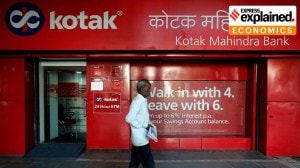- India
- International
How Europe is underwriting al-Qaeda
Terror group, affiliates have earned at least $125 m in kidnappings since 2008, half of it just last year.
By: RUKMINI CALLIMACHI
The cash filled three suitcases: 5 million euros. The German official charged with delivering this cargo arrived here aboard a nearly empty military plane and was whisked away to a secret meeting with the president of Mali, who had offered Europe a face-saving solution.
Officially, Germany had budgeted the money as humanitarian aid for the poor nation of Mali.
In truth, all sides understood that the cash was bound for an obscure group of Islamic extremists who were holding 32 European hostages, according to six senior diplomats directly involved in the exchange.
The suitcases were driven hundreds of miles north into the Sahara, where the bearded fighters, who would soon become an official arm of al-Qaeda, counted the money on a blanket thrown on the sand. Eleven years later, the handoff in Bamako has become a well-rehearsed ritual.

Kidnapping Europeans for ransom has become a global business for al-Qaeda, bankrolling its operations across the globe. Jihadists holding US journalist James Foley, who was beheaded last week, reportedly wanted $132 million as ransom.
While European governments deny paying ransoms, an investigation by The New York Times found that al-Qaeda and its direct affiliates have earned at least $125 million from kidnappings since 2008, of which $66 million was paid just in the past year.
The US Treasury Department put the total at around $165 million.
These payments were made almost exclusively by European governments, who funnel the money through a network of proxies, according to interviews conducted with former hostages and government officials in 10 countries in Europe, Africa and the Middle East.
In its early years, al-Qaeda received most of its money from deep-pocketed donors, but counterterrorism officials now believe the group finances the bulk of its recruitment, training and arms purchases from ransoms paid to free Europeans. Essentially, Europe has become an inadvertent underwriter of al-Qaeda.
The foreign ministries of France, Switzerland, Austria, Italy and Germany denied in emails or telephone interviews that they had paid the terrorists. “France does not pay ransoms,” said Vincent Floreani, deputy director of communication for France’s Ministry of Foreign Affairs.
“Kidnapping for ransom has become today’s most significant source of terrorist financing,” said David S Cohen, the US Treasury Department’s undersecretary for terrorism and financial intelligence, in 2012.
And business is booming: While in 2003 the kidnappers received around $200,000 per hostage, now they are netting up to $10 million, money that the second in command of al-Qaeda’s central leadership recently described as accounting for as much as half of his operating revenue. “Kidnapping hostages is an easy spoil,” wrote Nasser al-Wuhayshi, the leader of al-Qaeda in the Arabian Peninsula.
The income generated is so significant that internal documents show that as long as five years ago, al-Qaeda’s central command in Pakistan was overseeing negotiations for hostages grabbed as far as Africa. Its three main affiliates — al-Qaeda in the Islamic Maghreb, in northern Africa; al-Qaeda in the Arabian Peninsula, in Yemen; and al-Shabab, in Somalia — are now coordinating efforts, with a common kidnapping protocol.
Although the kidnappers threaten to kill their victims, only a small percentage of hostages have been executed in the past five years, a marked turnaround from a decade ago.
Only a handful of countries have resisted paying, led by the US and Britain. Although both these countries have negotiated with extremist groups — evidenced recently by America’s trade of Taliban prisoners for Sgt Bowe Bergdahl — they have drawn the line on ransoms.
It is a decision that has had dire consequences. While dozens of Europeans have been released unharmed, few US or British nationals have gotten out alive. “The Europeans have a lot to answer for,” said Vicki Huddleston, who was the US ambassador to Mali in 2003 when Germany paid the first ransom. “They pay ransoms, and then deny any was paid,” she said. “It makes all of our citizens vulnerable.”
On February 23, 2003, a group of four Swiss tourists woke up in their sleeping bags in southern Algeria to the shouts of armed men. Over the coming weeks, another seven tour groups travelling in the same corner of the desert vanished.
Armed with a few hunting rifles and old AK-47s, the kidnappers succeeded in sweeping up dozens of tourists in several consecutive weeks, mostly from Germany, but also from Switzerland, Austria, Sweden and Holland. Though they planned the first few ambushes, they appear to have grabbed others by chance.
The kidnappers did not seem to have a plan. The only food they had was the canned goods the tourists had. The only fuel was what was in each gas tank. They abandoned the cars one by one as they ran out of fuel.
A 47-year-old Swedish hostage, Harald Ickler, remembers being very hungry. “Once they had us, they didn’t seem to know what to do with us,” said Reto Walther of Switzerland. “They were improvising.”
Crucially, although the European nations had firepower superior to that of the mujahedeen, they deemed a rescue mission too dangerous.
The jihadists asked for weapons. Then for impossible-to-meet political demands, like the removal of the Algerian government. When a 45-year-old German woman died of dehydration, cornered European officials began considering a ransom concealed as an aid payment.
In 2004, an al-Qaeda operative, Abdelaziz al-Muqrin, published a how-to guide to kidnapping, in which he highlighted the successful ransom negotiation of “our brothers in Algeria”. Within a few years, there was a split within al-Qaeda, with the group’s affiliate in Iraq grabbing foreigners specifically to kill them.
In Algeria, the kidnappers of the European tourists followed a different path. They used the 5 million euros as the seed money to grow into a regional force, and be accepted as al-Qaeda in the Islamic Maghreb.
By February 2, 2011, when their lookouts in southern Algeria spotted a 53-year-old Italian tourist, Mariasandra Mariani, admiring the rolling dunes, they were running a sleek kidnappings operation. Mariani would later learn they had an infrastructure of supplies buried in the sand and marked with GPS coordinates. One afternoon they stopped just above the lip of a dune. The fighters got down and unfastened a shovel. Then she heard the sound of a car engine. They had buried an entire vehicle in sand.
“It was then that I realised, these aren’t just normal criminals,” Mariani said. Weeks passed before Mariani’s captors announced they were going to allow her to make a phone call. They dialled the number for Al-Jazeera.
During her 14-month captivity, whenever the kidnappers felt that attention had flagged, they forced Mariani to record a video message, surrounded by her armed captors.
All over Europe, families rallied, pressuring governments to pay. Mariani was ultimately released, along with two Spanish hostages, for a ransom that a negotiator involved in her case said was close to 8 million euros.
Negotiators believe that the al-Qaeda branches have now determined which governments pay. Of the 53 hostages known to have been taken by al-Qaeda’s official branches in the past five years, a third were French. Small nations like Austria, Switzerland and Spain account for more than 20 per cent of the victims.
By contrast, only three Americans are known to have been kidnapped. “For me, it’s obvious that al-Qaeda is targeting them by nationality,” said Jean-Paul Rouiller, the director of the Geneva Center for Training and Analysis of Terrorism.
Almost a year into her captivity in 2012, Mariani thought she could not take it anymore. She told her guard that her modest family, which grows olives, did not have the money, and that her government refused to pay ransom. Her captor reassured her.
“Your governments always say they don’t pay,” he told Mariani. “When you go back, I want you to tell your people that your government does pay. They always pay.”
Apr 24: Latest News
- 01
- 02
- 03
- 04
- 05







































